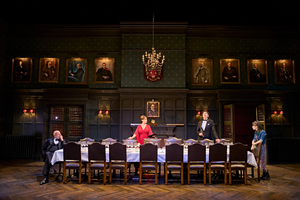Review: THE SNAIL HOUSE, Hampstead Theatre
Sir Richard Eyre takes aim... and misses

 Perhaps expectations were raised too high. A beautiful set (by Tim Hatley) comprising an oak-panelled room, its walls filled with glowering, Ruddigoreish portraits; Sir Richard Eyre CH CBE on the programme and other members of theatrical royalty scattered about the stalls on press night; a production that addresses the defining issue of this century to date - the global pandemic - and rolls in a bit of 'woke', climate change and good ol' family troubles to boot. Maybe no play could live up to that weight of promise, but quite why The Snail House feels so insubstantial is hard to pin down.
Perhaps expectations were raised too high. A beautiful set (by Tim Hatley) comprising an oak-panelled room, its walls filled with glowering, Ruddigoreish portraits; Sir Richard Eyre CH CBE on the programme and other members of theatrical royalty scattered about the stalls on press night; a production that addresses the defining issue of this century to date - the global pandemic - and rolls in a bit of 'woke', climate change and good ol' family troubles to boot. Maybe no play could live up to that weight of promise, but quite why The Snail House feels so insubstantial is hard to pin down.
We're at a birthday celebration for Professor Sir Neil Marriot, distinguished paediatrician recently honoured after becoming something of a celebrity during the Covid televised press conferences. He's Northern, spiky and displays absolutely none of the characteristics that suggest he would have been any good at reassuring the public (though the difference between public and private facades is a continual theme to be fair).
His wife, Val, has been browbeaten into compliance with his wants; this son, Hugo, is an archly camp government SPAD; his daughter, Sarah, is self-ostracised from the family and an Extinction Rebellion foot soldier.
One feels for the actors. Vincent Franklin gets little in the way of nuance with which to work as Neil. The question of how a doctor empathetic to his child patients and their parents can bark so ferociously at his 18 year-old daughter (18!) is left in the air - the character just doesn't add up. Eva Pope (Val), Patrick Walshe McBride (Hugo) and Grace Hogg-Robinson (Sarah - a girl uncannily like the one in Mike Bartlett's King Charles the Third) can do little except inhabit the cliches as written.
Fortunately, the workers have it better. Megan McDonnell (the irritating, but very sharp would-be singer, Wynona) and Raphael Famotibe (tremendous in an unwritten role) have a lot of fun as the catering staff, a kind of Greek chorus who reflect on the grotesques for whom they are working and inject a much-needed corrosive of realpolitik into the privilege washing about us elsewhere.
The moral centre of the play falls to Amanda Bright as Florence, the catering manager who delivers a fine performance, balancing anger with forgiveness, illustrating the power of holding on to one's principles and the value of redemption. The play is elevated from soapy squabbling whenever she is on stage. She so commands the eye and engages our emotions that one wonders whether there's a much better play inside the one we see, a drama with her as the focus.
The closing arguments that set the privilege and arrogance of the medical profession (and, by extension, the middle class) against the powerlessness and punishment of the poor bloody infantry did not appear to be fully worked through. Though clearly drawing parallels with the appalling errors that sent innocent women to prison after cases involving Sudden Infant Death Syndrome, the issues presented in this play's conclusion are different and required more careful teasing out.
References to the differing burdens of proof in civil and criminal cases and the role of the connected, but separate, roles of expert witnesses, the judge and jury were not clarified as required given the gravity of the stakes. This was disappointing as the play is not long (by today's standards) at two hours including the interval, so there was scope to disentangle complexities. The ambiguity that leads to hard cases making bad law could still be there (as is done much more effectively in Prima Facie) but we would have a much better idea of who does what and why in the courtroom.
Perhaps it's an old fault that one sees in even the most experienced of practitioners. Eyre writes in the programme that he continually asked the actors about the lines and listened to their feedback. But maybe if he had a director on board (and not taken on writer-director responsibilities himself) some of the play's flaws would not have reached the version we see on stage.
The Snail House is at Hampstead Theatre until 15 October
Photo Credit: Manuel Harlan
Reader Reviews

Videos

